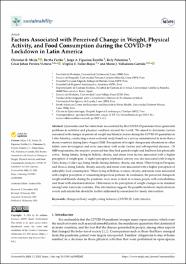“Factors Associated with Perceived Change in Weight, Physical Activity, and Food Consumption during the COVID-19 Lockdown in Latin America“

Ver/
Descargar
(application/pdf: 452.0Kb)
(application/pdf: 452.0Kb)
Fecha
2023-01-28Autor(es)
Mejia, Christian R.
Farfán, Bertha
Figueroa-Tarrillo, Jorge A.
Palomino, Kely
Pereira-Victorio, César Johan
Failoc-Rojas, Virgilio E.
Valladares-Garrido, Mario J.
Metadatos
Mostrar el registro completo del ítemResumen
“Quarantine and the restrictions necessitated by the COVID-19 pandemic have generated
problems in nutrition and physical condition around the world. We aimed to determine factors
associated with changes in perceived weight and lifestyle factors during the COVID-19 quarantine in
Latin America, conducting a cross-sectional study based on a survey administered in more than a
dozen countries during June–August 2020. Perceptions of weight changes and alterations in other
habits were investigated and were associated with social factors and self-reported diseases. Of
8800 respondents, the majority perceived that they had gained weight and had been less physically
active. Being female, living in Bolivia, obesity, and stress were factors associated with a higher
perception of weight gain. A higher perception of physical activity was also associated with living in
Chile, being of older age, being female, having diabetes, obesity, and stress. When living in Paraguay
and Mexico, being female, obesity, anxiety, and stress were associated with a higher perception of
unhealthy food consumption. When living in Bolivia, women, obesity, and stress were associated
with a higher perception of consuming larger food portions. In conclusion, the perceived changes in
weight and lifestyle during the pandemic were more evident in women, people with comorbidities,
and those with emotional distress. Differences in the perception of weight changes were minimal
among Latin American countries. This information suggests the possible metabolic implications in
at-risk individuals that should be further addressed by researchers for timely intervention.
“
Colecciones
- SCOPUS [380]

